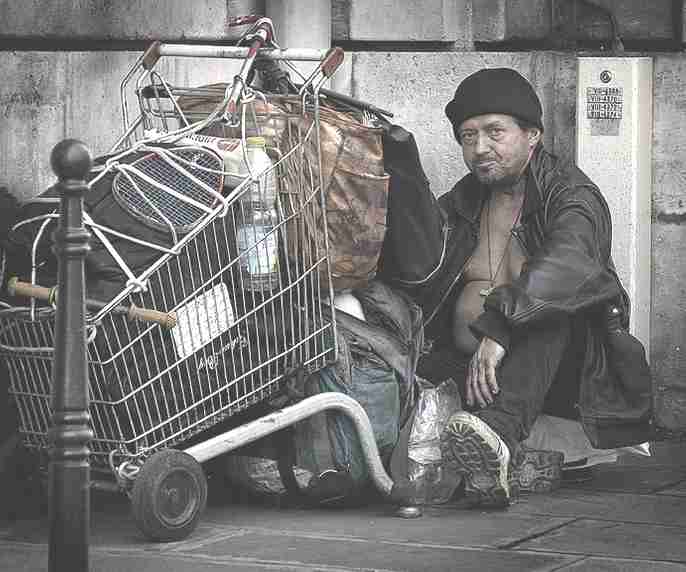
Poverty (also called penury) is deprivation of common necessities that determine the quality of life, including food, clothing, shelter and safe drinking water, and may also include the deprivation of opportunities to learn, to obtain better employment to escape poverty, and/or to enjoy the respect of fellow citizens. According to Mollie Orshansky who developed the poverty measurements used by the U.S. government, "to be poor is to be deprived of those goods and services and pleasures which others around us take for granted." This, according to wikipedia, is a pretty fair definition of poverty but one wonders how the way that definition looks may change in the near future.
Don't we assume that poverty in the United States means you can't provide for yourself and must have help to put a roof over your head or food on your table. Financially you are unable to to take care of yourself or your family. But is that really poverty? It is "poverty level" but don't most of us have the opportunity to learn so we can obtain better employment and "escape" poverty?
As our economy spirals downward worldwide, what will poverty look like? Will street after street of $500,000 homes stand empty as more of us turn to shopping carts as our only means of affordable housing and travel? Will "common necessity" no longer mean a roof over our heads but a shopping basket to keep our meager possessions in? Will an education protect our jobs? Find us new jobs when businesses go bankrupt?
Worldwide, approximately 25,000 people die every single day of starvation or other poverty related causes. In September 2000, the 189 countries of the United Nations unanimously agreed to “spare no effort to free our fellow men, women and children from the abject and dehumanizing conditions of extreme poverty,” specifically hunger and the “major diseases that afflict humanity.” They agreed to commit .7% of their national income. That's 7/10ths of one percent of each $100 that we make, world wide for a total of $195 billion a year. Of the 22 of the world’s wealthiest countries that agreed to commit to 7/10ths of one percent the United States is in last place towards accomplishing their commitment.
Norway, Sweden, Luxemborg, Denmark and the Netherlands have all reached their goals contributing over 80 cents per one hundred dollars of income. The United States is tied with Greece in contributing a total of 16 cents per 100 hundred dollars of income.
What will tomorrow bring? As we bail out institution after institution we watch as only the very rich are helped and still the stock markets fall lower and lower and no one on main street is being helped. I can't help but wonder if those who are our "leaders" are working for "us" or against "us." Maybe, I am the one that is confused? Maybe, I don't understand who "us" is.
Poverty. What it looks like today and what will it look like by the end of 2008? Who is truthfully telling us? Today is blog action day.
Don't we assume that poverty in the United States means you can't provide for yourself and must have help to put a roof over your head or food on your table. Financially you are unable to to take care of yourself or your family. But is that really poverty? It is "poverty level" but don't most of us have the opportunity to learn so we can obtain better employment and "escape" poverty?
As our economy spirals downward worldwide, what will poverty look like? Will street after street of $500,000 homes stand empty as more of us turn to shopping carts as our only means of affordable housing and travel? Will "common necessity" no longer mean a roof over our heads but a shopping basket to keep our meager possessions in? Will an education protect our jobs? Find us new jobs when businesses go bankrupt?
Worldwide, approximately 25,000 people die every single day of starvation or other poverty related causes. In September 2000, the 189 countries of the United Nations unanimously agreed to “spare no effort to free our fellow men, women and children from the abject and dehumanizing conditions of extreme poverty,” specifically hunger and the “major diseases that afflict humanity.” They agreed to commit .7% of their national income. That's 7/10ths of one percent of each $100 that we make, world wide for a total of $195 billion a year. Of the 22 of the world’s wealthiest countries that agreed to commit to 7/10ths of one percent the United States is in last place towards accomplishing their commitment.
Norway, Sweden, Luxemborg, Denmark and the Netherlands have all reached their goals contributing over 80 cents per one hundred dollars of income. The United States is tied with Greece in contributing a total of 16 cents per 100 hundred dollars of income.
What will tomorrow bring? As we bail out institution after institution we watch as only the very rich are helped and still the stock markets fall lower and lower and no one on main street is being helped. I can't help but wonder if those who are our "leaders" are working for "us" or against "us." Maybe, I am the one that is confused? Maybe, I don't understand who "us" is.
Poverty. What it looks like today and what will it look like by the end of 2008? Who is truthfully telling us? Today is blog action day.

1 comment:
Right on!
We've all seen how successful our government has been, throwing money at our own "war on poverty".
It's high time we took such success to the global level.
Post a Comment